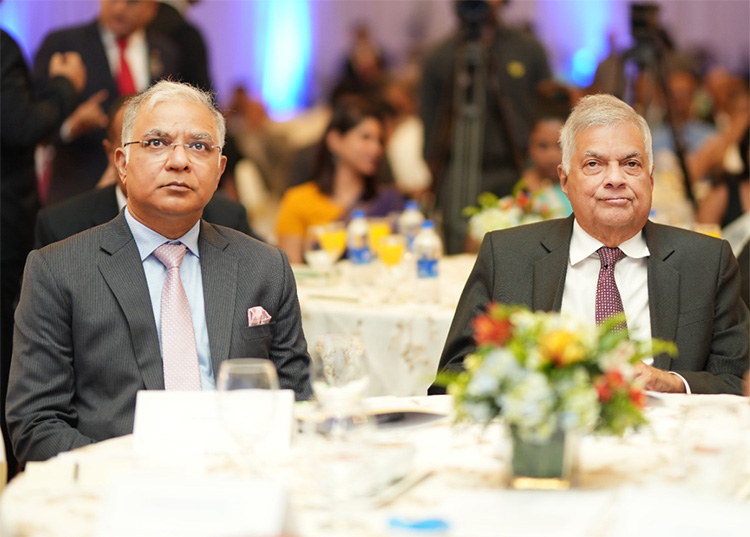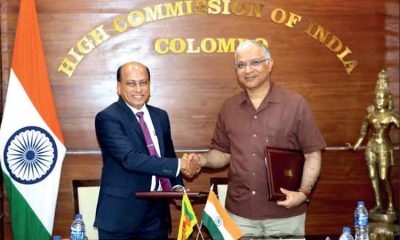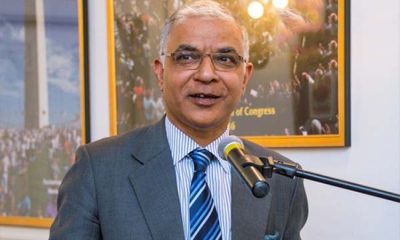News
India, Sri Lanka going ahead with Modi-Ranil ‘vision document’

Santosh Jha stresses importance of Unique Digital Identity project
Indian High Commissioner Santosh Jha has said that India is working with Sri Lanka to roll out the Unique Digital Identity (UDI) Project based on modular micro service based architecture aka MOSIP architecture. He has said they strongly believe that as in the case of India this UDI will be the beginning of digital magic for Sri Lanka.
Jha made the announcement at the inauguration of a conference at the Taj where experts explored the immense potential for Digital Public Infrastructure (DPI) for Sri Lanka. Among the invitees were President Ranil Wickremesinghe and senior government officials.
Jha said that the high profile project was in line with the India-Sri Lanka Vision Document, adopted by Indian Premier Narendra Modi and President Ranil Wickremesinghe, in New Delhi, in July 2023, where they agreed to leverage India’s DPI in accordance with Sri Lanka’s requirements and priorities towards effective and efficient delivery of citizen-centric services to the people of Sri Lanka.
The Indian High Commission quoted Jha as having told the conference that the value proposition of DPI is the combination of three components—technology, governance and markets—to achieve sustainable and robust digital transformation. “It is not about one-off technology solutions but about incorporating a wider theory of change that brings about digitisation across domains.
This is the very premise of the Conference.”
The conference consisted of three sessions and what the IHC called breakout meetings which explored the transformative potential of DPI for enabling service delivery, empowering communities by fostering inclusivity and enriching the economy by driving innovation.
Having underlined DPI as a vital enabler for the digitisation of the Sri Lankan economy, President Wickremesinghe emphasised the need for collaboration with India in this domain, highlighting the potential of fast-tracking growth by adapting India’s successful strategies domestically. India’s digital transformation and the significance of DPI and India Stack was elaborated upon by Jha and Dr. Pramod Varma, Co-Chair, Centre for Digital Public Infrastructure (CDPI) in his presentation during the opening plenary.
The other two sessions saw discussions amongst experts from India, Sri Lanka and the region, on the themes of Accelerating Digital Sri Lanka and Unlocking the Digital Stack, respectively. The former focused on roadmap for adoption of DPI in Sri Lanka and the resultant acceleration towards e-governance across the board, with the opening remarks by Kanaka Herath, State Minister of Technology. The latter went beyond foundational DPI to discuss use cases marrying technology, markets and governance with a special focus on the positive externalities in the startups domain. This session was opened by MP Dr. Harsha de Silva.The conference was particularly enriched with several breakout meetings between visiting experts from India and their Sri Lankan counterparts as well as other stakeholders. A key highlight of these was an interaction of the visiting senior officials from Government of India’s Ministries handling Digital India and Startup India programmes with Senior Officials who are leading the six Working Groups of Government of Sri Lanka on digital economy.
Futuristic linkages were also initiated in the startup and IT industries domain on the side-lines of the conference. In the afternoon Startup India’s team held a capacity building workshop for startups in Sri Lanka, including sessions by Indian experts on the art of pitching and effective marketing. The Chief of IIT Chennai’s Incubator ‘Parvartak’ interacted with key startup incubators in Sri Lanka. Chairman NASSCOM called on President of Sri Lanka.
Jha explained how DPI project changed India. Jha said: “India’s own journey stands as testimony to the power of DPI. The digital transformation in India over the last decade or so has been driven by these interoperable and open protocols of DPI. India’s DPI journey started with the basic need to provide direct access to public services and Government benefits to our citizens. This is what gave birth to India’s Digital Identity Number AADHAAR- and the Unique Identification Authority of India in 2016. This became the foundational building block of DPI … and the magic began.
At the heart of this magic is what we call India Stack: government-backed APIs, or Application Programming Interfaces, upon which third parties can build software with access to government IDs, payment networks and data. This digital infrastructure is interoperable and “stacked” together – meaning that private companies can build apps integrated with state services to provide consumers with seamless access to everything from welfare payments to loan applications and making investments.
Probably even the architects of AADHAAR didn’t envisage that India was on path to finding a world-beating solution for building out and regulating the online commons that is more equitable than the laissez-faire approach, more transparent and more innovative than some of the regulation-heavy models. “
News
Japan-funded anti-corruption project launched again

‘NPP taking credit for what was started during previous govt.’
The National Anti-Corruption Action Plan (NACAP) 2025-2029, ceremonially launched by President Anura Kumara Dissanayake on 09 April, 2025, had actually got underway during former President Ranil Wickremesinghe’s tenure, sources said.
According to a joint media release issued by the interested parties, following the launch, also attended by Chief Justice Murdu Fernando, PC, the Commission to Investigate Allegations of Bribery and Corruption (CIABOC)-led project received the financial backing of Japan and the technical expertise of the UNDP.
In response to The Island query regarding the recipients of the funding, exact amounts provided to them and the duration of the project, sources said that the 18-month-long project, implemented by the UNDP, had been launched in March 2024. According to sources, the project was launched with Yen 137 mn made available through the Japanese Supplementary Budget (approximately 931,000 USD) six months before the last presidential election.
New Japanese Ambassador in Colombo Akio Isomata, and UNDP Resident Representative Ms. Azusa Kubota, were among those present at the 09 April launch.
Isomata’s predecessor Mizukoshi Hideaki finalised the agreement with Ms Kubota on 12 February, 2024, to pave the way for the new project, titled ‘The Project for Promoting Economic Governance through Anti-corruption Policy Support.’
Assistance from Japan and UNDP was in line with their efforts to enable Sri Lanka struggling to resolve the economic crisis.
The Japanese Embassy said on 12 February, 2024, that the project sought to (1) strengthen legal and policy frameworks; (2) improve coordination among key institutions combating financial and tax crimes; and (3) enhance strategic institutional and individual skills and capacities around combating anti-corruption through strategic action.
By Shamindra Ferdinando
News
Ranil makes statement to CIABOC

Former President Ranil Wickremesinghe leaving the Commission to Investigate Allegations of Bribery or Corruption (CIABOC) yesterday after making a statement related to ongoing investigation into former State Minister Chamara Sampath Dassanayake. Dassanayake is in remand custody pending investigations into an alleged misappropriation of funds during his tenure as the Uva Province Chief Minister.
(Pic by Nishan S. Priyantha)
News
Nearly 500 kilos of heroin destroyed under court supervision

The police and court officials yesterday (28) supervised the destruction of nearly 500 kilos of heroin at the INSEE Cement Plant located in Puttalam.
The following is the text of statement issued by the INSEE Ecocycle Lanka (Private) Limited in this regard: ” Building on a consistent track record of supporting national anti-narcotics initiatives and eradicating a national menace, INSEE Ecocycle Lanka (Private) Limited, the leading professional waste management solutions provider, collaborated once more with the Sri Lanka Police Narcotics Bureau (PNB) and the National Dangerous Drugs Control Board (NDDCB) to responsibly dispose of 494.048 kgs of confiscated heroin via co-processing technology.
This marks the fourth collaboration between INSEE Ecocycle and law enforcement authorities for the destruction of such substances, following successful disposals carried out in 2018, 2019, and 2023 totalling approximately 1804 kgs of dangerous drugs.
The disposal, which ensured environmentally safe and secure destruction of the narcotics, was conducted on 28 April at the INSEE Cement Plant located in Puttalam, under the strict supervision of PNB officials and court-appointed representatives.
Prior to disposal, the confiscated heroin, seized during national anti-narcotics operations, was rigorously verified by the Government Analyst Department (GAD), NDDCB, and judicial authorities to ensure compliance with legal and safety protocols.
INSEE Cement Sri Lanka Chairman/CEO Nandana Ekanayake explained: “INSEE Cement is the only fully integrated cement manufacturing facility in the country with the required capability to provide this solution. We proudly support the national cause and contribute to building a drug-free nation. Sri Lanka’s only operational Cement Kiln Co-processing facility is in our Puttalam Cement Plant. INSEE Cement has always focused on the Health and Safety of all our stakeholders. As a responsible corporate citizen, we are proud and honoured to extend our support and ensure the safe disposal of harmful substances with utmost care and professionalism.”
Emphasizing the significance of the initiative, Sujith Gunawardena, Director, INSEE Ecocycle, said, “As Sri Lanka’s sole provider of co-processing technology, we are proud to collaborate with the authorities and support this critical effort. We successfully disposed of the confiscated narcotics in an environmentally friendly and sustainable manner, complying with all the regulations. Co-processing offers a complete destruction solution for hazardous waste at extremely high temperatures, eliminating it without harmful emissions or residual byproducts. It is a cleaner and more sustainable solution than traditional incineration. It is globally accepted as the superior waste management method, significantly reducing greenhouse gas emissions and aligning with global best practices for sustainable waste management.”
INSEE Ecocycle played a critical role in the technical evaluation of the feeding mechanism and pre-processing activities, collaborating closely with PNB and NDDCB to guarantee the safe disposal of the hazardous substance. The comprehensive technical evaluation comprised thorough risk assessments and mitigation action plans, addressing environmental, social, health, and safety concerns for the entire pre-processing and co-processing value chain.
Throughout the confiscated heroin disposal process, experts from PNB and NDDCB provided guidance on critical components, including laboratory analyses and procedural adherence, culminating in the secure and transparent destruction of the narcotic substance. The disposal took place using cement kiln co-processing technology, also known as thermal destruction, at temperatures of 1800- 2000 °C with a 4-6 sec residence time and under fully controlled process parameters.
INSEE’s co-processing facility satisfies all regulatory requirements and technical standards and is globally adopted for waste management. The facility offers a complete solution with zero harmful emissions to the environment. It has also obtained all required licenses, such as the Environmental Protection License and Scheduled Waste Management License from the Central Environmental Authority and the Provincial Environmental Authority, and certifications including ISO 9001, ISO 14001, ISO 17025, ISO 39001, and ISO 45001.
With a proud legacy of over two decades, INSEE Ecocycle has managed more than 1.3 million metric tons of industrial waste in collaboration with over 1,000 customers, including multinationals, local conglomerates, corporations, government authorities at central and regional levels, and recycling partners. The partnership demonstrates the company’s commitment to advancing Sri Lanka’s circular economy and environmental stewardship.”
-

 News7 days ago
News7 days agoOrders under the provisions of the Prevention of Corruptions Act No. 9 of 2023 for concurrence of parliament
-

 Business2 days ago
Business2 days agoPick My Pet wins Best Pet Boarding and Grooming Facilitator award
-

 News6 days ago
News6 days agoProf. Rambukwella passes away
-

 News2 days ago
News2 days agoNew Lankan HC to Australia assumes duties
-

 Features2 days ago
Features2 days agoKing Donald and the executive presidency
-

 Business2 days ago
Business2 days agoACHE Honoured as best institute for American-standard education
-

 Features4 days ago
Features4 days agoThe Truth will set us free – I
-

 Features6 days ago
Features6 days agoThe sea-change after Modi’s visit
















